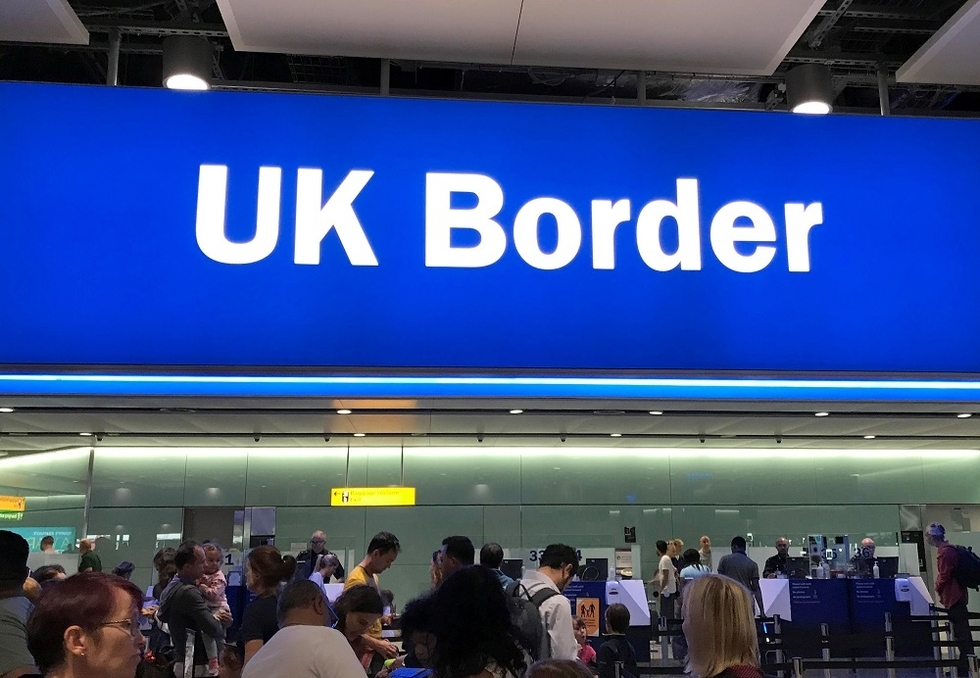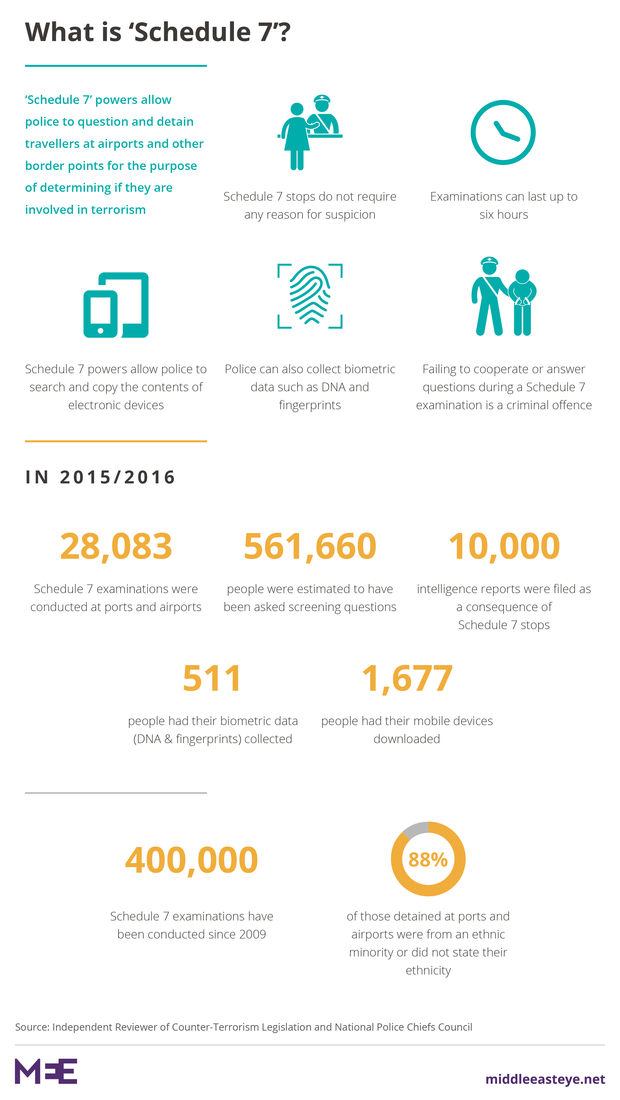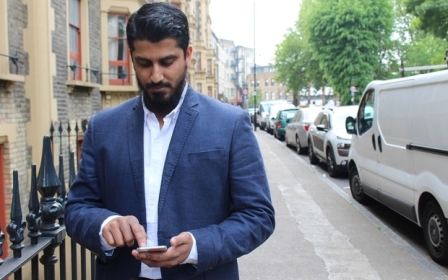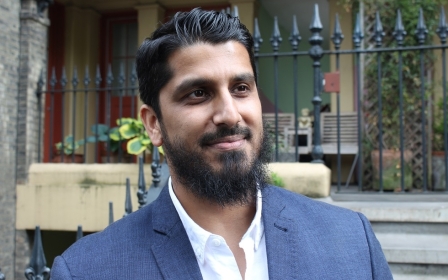UK 'Schedule 7' stops in violation of human rights, European court rules

British counter-terrorism laws allowing police and immigration officials to detain and question people at ports and airports violated human rights and lacked sufficient legal safeguards, the European Court of Human Rights has ruled.
In a judgment published on Thursday, the court ruled unanimously that the use of Schedule 7 powers to question Sylvie Beghal, a British resident who was returning to the country after visiting her husband in prison in France in 2011, had violated her right of respect for her private and family life and had not been "in accordance with the law".
The court also said that use of the stop, search and question powers had “not been sufficient subscribed and nor were there adequate legal safeguards against abuse”.
“In particular, people could be subjected to examination for up to nine hours and compelled to answer questions, without being formally detained or having access to a lawyer,” the court said in a statement.
It said that the broad scope of the powers, which did not require border officials to demonstrate that stops were based on a “reasonable suspicion” that someone might be involved in terrorism, had made it hard to review the exercise of the powers.
Detention powers
The judgment also flagged up human rights concerns about Schedule 7 detention powers, which it said had “the potential to result in a much more significant interference with a person’s rights” under the European Convention on Human Rights.
But it also cited a 2011 report by the UK's Independent Reviewer of Terrorism Legislation which said that Schedule 7 stops had contributed to a “rich picture of the terrorist threat” as evidence that the powers had “real value in protecting national security and had not, in fact, been abused”.
A Home Office spokesperson told Middle East Eye that the government was disappointed by the judgment and would consider its implications carefully.
Beghal, who is a French national living in Leicester, was stopped for questioning after arriving at East Midlands airport with her three children in January 2011 after visiting her Algerian husband, Djamel Beghal, who was convicted and imprisoned for terrorism offences in France in 2005.
Police and immigration officers informed her that they needed to establish whether she was a “person concerned in the commission, preparation or instigation of acts of terrorism”.
After refusing to answer questions without a lawyer present she was told she was “free to go”, but she was subsequently charged and pleaded guilty to failing to comply with a Schedule 7 stop, a terrorism offence.
In 2015, her appeal was rejected by the Supreme Court, the UK's highest court, which concluded that the stop had been “proportionate” and necessary for the investigation of terrorism.
Djamel Beghal was released from prison last year and extradited to Algeria where he faces another trial on terrorism charges.
Right to privacy and a family life
On Thursday, the ECHR said that Sylvie Beghal's stop amounted to a violation of Beghal's rights under article 8 of the European Convention on Human Rights, which states that “everyone has the right to respect for his private and family life, his home and his correspondence”.
"At the time the applicant had been stopped, the power to examine persons under Schedule 7 had been neither sufficiently circumscribed nor subject to adequate legal safeguards against abuse," the court said in a legal summary.
"While the absence of any requirement of 'reasonable suspicion' alone was not fatal to the lawfulness of the regime, when considered together with the fact that the examination could continue for up to nine hours, during which time the person would be compelled to answer questions without any right to have a lawyer present, and the possibility of judicially reviewing the exercise of the power was limited, the Schedule 7 powers were not 'in accordance with the law'."
It said that it had not considered changes to Schedule 7 powers introduced in 2014 as part of the Anti-Social Behaviour, Crime and Policing Act, which have reduced the length of time that people can be detained from nine hours to six hours, and giving them a right to request a solicitor if questioned for more than one hour.
The act also required officers conducting Schedule 7 stops to be "designated and trained for this purpose".
Further amendments to Schedule 7 introduced in this year's Counter-Terrorism and Security Act mean that information given under compulsion during a Schedule 7 examination cannot be used in a subsequent criminal trial.
Schedule 7 powers have long been contentious because of complaints that they are disproportionate and discriminatory against Muslims and ethnic minorities.
In a high-profile case last year, the managing director of Cage, an advocacy organisation which campaigns to highlight civil liberties issues raised by counter-terrorism policies, was convicted under Schedule 7 after refusing to give police officers passwords and PIN codes for his electronic devices.
The conviction was upheld on appeal, but Muhammad Rabbani said he intended to challenge the judgment in the Supreme Court.
In a statement after the European court's judgment, Rabbani said: "Whilst judges in Europe were considering this, Schedule 7 continued to impact tens of thousands of people transiting through UK borders. The rule of law requires that state powers are not racist or Islamophobic. The evidence is that, with racial profiling at its heart, Schedule 7 is targeted at minority ethnic communities and those who are regarded as activists.”
In the most recent report by the Independent Reviewer of Terrorism Legislation on the use of Schedule 7 powers, Max Hill noted that the number of port stops had fallen from about 60,000 to about 16,000 between 2012 and 2017.
But he said also that the number of resultant detentions had increased from 614 to 1,700 in the same period.
Many more passengers are also subjected to screening questions, or “short stops”, prior to a formal Schedule 7 stop, lasting up to a few minutes. Police are not required to keep records on those stopped for screening.
Commenting on Thursday's judgment on Twitter, David Anderson, a former reviewer of terrorism legislation, said that both sides would claim comfort from the result.
Beghal had “undeniably won her case,” he said, but the government could argue that changes since 2011 had “remedied any defect”.
The court did not award Beghal warded 25,000 euros to Beghal's lawyers to cover costs and expenses.
A spokesperson for the Home Office said: "The use of Schedule 7 is of the utmost importance to the police in their work to combat terrorism and keep our citizens safe so we are disappointed with today’s ruling.
“The Court has acknowledged that the Anti-Social Behaviour, Crime and Policing Act 2014 and the Counter-Terrorism and Border Security Act 2019 have introduced further safeguards to address similar concerns to those expressed in this judgment.
“We will now consider the implications of this judgment carefully.”
Middle East Eye propose une couverture et une analyse indépendantes et incomparables du Moyen-Orient, de l’Afrique du Nord et d’autres régions du monde. Pour en savoir plus sur la reprise de ce contenu et les frais qui s’appliquent, veuillez remplir ce formulaire [en anglais]. Pour en savoir plus sur MEE, cliquez ici [en anglais].






